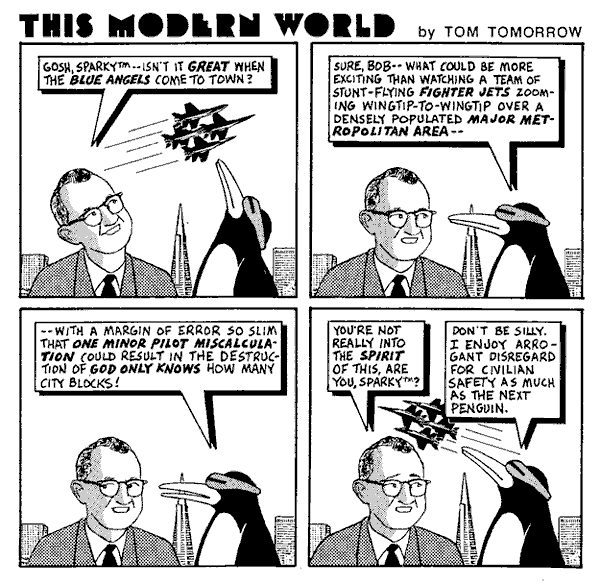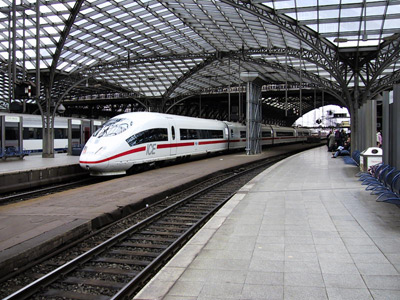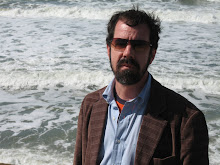
I decided upon the onset of this century that I would no longer require or own an automobile. My partner and I are beginning our eighth year without the many restraints of automobile ownership. We are both fortunate enough to live within a ten minute stroll to our workplace (we work in the same hotel). That is twenty minutes per day that we spend walking to and fro. We don't even have to rely upon public transit. We currently live in San Francisco – a city known for public transit, albeit far from efficient – and rather easily circumnavigated and pedestrian friendly. However, we lived in Miami for two years without cars also, and we managed to figure out a relatively easy commute on rail. It takes some creativity and planning and some personal sacrifice to live without a car, but I propose that the advantages by far outweigh any small loss of momentary freedom. Allow me to highlight the advantages of remaining outside the automobile industry loop.
1.) Economic advantages:

These are many. We are a working class, blue collar household, and even though we are living without children, it takes both of our salaries to pay the basic necessities of life – namely food and shelter. We like most people in this country live from paycheck to paycheck. Home ownership in the cities is prohibitive for us, but rent tends to be more affordable, so we rent. If we were to choose life in the suburbs, undoubtedly we could rent something for less, and it would likely be larger than the one bedroom apartment we now have. Yet to do so would require that we own at least one car. Since we do not have the economic means of purchasing a new car, that would mean financing one at a high interest rate. We then would have to purchase the most costly insurance. Even if we decided to purchase a used car, then one has to factor in higher maintenance costs, and the unreliability of such transportation. There are registration and smog fees. Gas is soon to be $4 per gallon here. Even if we were not to commute by car, it is almost always necessary to drive to the train station, in which case parking is yet another expense. And we have not even discussed time lost during one's commute, which would be close to two hours per day in the best case scenario. All this said, we would be better served by ownership of two cars in such case as our shifts do not coincide, or if one need to run errands on his day off. So for the sake of argument, let's say we purchase one economical new car and one fairly used car. Let's assume we commute by rail and limit our driving to the most essential errands.
Cost of automobile #1: $15,000 financed over 60 months, or $350 per month.
Approximate cost of insurance for 2 cars: $200 per month
Gas & maintenance: $200 per month
Registration/licensing & other fees: $100 per month
Approximate commute costs: $200 per month
Time spent commuting: 80+ hours per month
Right here one can see that by a very conservative estimate, we have over $1,000 per month dedicated to automobile ownership and over 80 hours of lost time in order to either rent or purchase a home in the suburbs. Now one can work in the suburbs, but due to the nature of suburban living, a car is still pretty much a necessity. So one could save time, but the economic forecast remains. A two-bedroom apartment in the city is around $2500 per month. If one rents in the suburbs, the monthly rent could drop to $1500. Notice that the difference in rent is offset entirely by automobile ownership. And more than likely, it would indeed cost more to live outside the city, even with savings in the cost of food and household items that one generally sees in the suburbs.
2.) Psychological & Health Advantages:

Obviously living without a car is more conducive to healthy living. First of all, one tends to walk. Walking is the main activity that human beings have engaged in since before we were homo sapiens. Walking is an amazingly efficient mode of transportation. As a matter of fact, it is the most efficient means of transportation nature has designed. Humanity did one up nature with the invention of the bicycle. However, the automobile is amazingly inefficient and destructive to the environment, both in its manufacture and its operation. One of the most life threatening things we all do on a regular basis is to drive our car. Even with seat belts and airbags, driving has been shown statistically to shave off 19 minutes of one's life for every hour of interstate/freeway driving and 8 minutes for every hour of city driving (not to mention the danger to pedestrians!). Ironically, cardiovascular disease and obesity are the biggest killers, and much of that could be prevented by living a life other than the sedentary one many of us now live. Get out and walk daily. Driving is a highly stressful activity, especially when one is stuck in traffic and running late. I oftentimes wonder just how much impact this has on productivity at work and anger and rage within households. However, all this stated, most American cities and towns are not built for pedestrians. I commend a fantastic website:
Carfree.com This is a wonderful resource. Buy the book.
3.) Environmental Advantages:

Ivan Illich published an article in "Le Monde" in 1973, entitled "Energy & Equity". It is available
online.
It goes without saying that automobiles have had a tremendously negative effect upon the environment, both in their manufacture and operation. Petroleum is a natural resource that is quite literally wasted in making of fuel for automobiles. The greenhouse gasses and other noxious substances emanating from tailpipes is doing plenty to degrade our quality of life. We are now fighting "corporate wars" over petroleum in order to maintain our current paradigm. Lives are being needlessly terminated, science is ignored and underfunded, democracy itself is at stake, our environment is being plundered, we are borrowing upon our grandchildren's futures and all this for the sake of driving the latest model of S.U.V., or as I prefer to call them, S.A.V. (Suburban Assault Vehicles). Once one opts out of the current automobile paradigm, it will begin to shift. The more people that do this, the more resources we will have for alternatives. We can no longer afford to continue in the direction we've been headed. Now is the time for immediate action.
Get out of your car now. Stop helping support terrorism by walking to work.




















